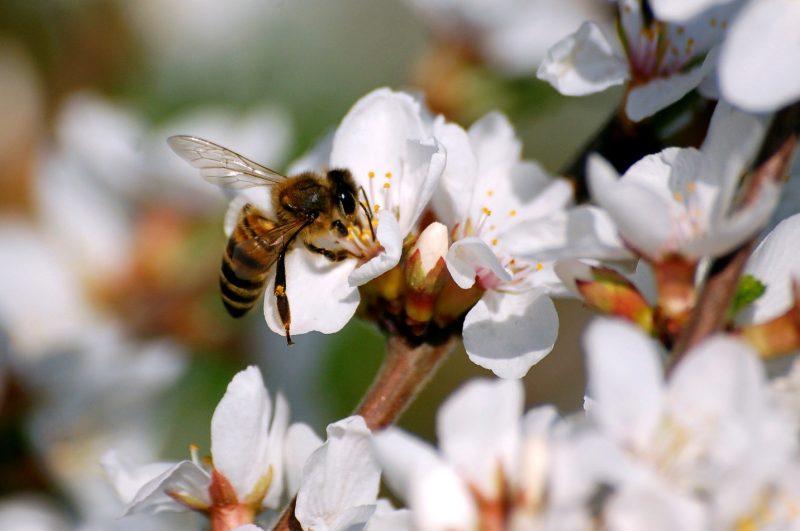My family and I were spending our Saturday morning outside in the garden a few weeks ago, when something happened that stopped my always-on-the-go 2 ½ year-old in his tracks. Our weeping cherry tree had just blossomed and its drooping branches had formed a delicate canopy of soft white flowers. My curious toddler dashed under the branches into his “cave” then came to a quick halt and breathlessly called out to me, “Mommy, listen to the bees.”
I set down my trowel, slipped in under the canopy, and was treated to the loud hum of collective buzzing. We stood there and watched in awe as the honeybees darted back and forth from blossom to blossom working their magic.
This magic, so to say, is actually the act of pollination. In order for plants to make seeds to reproduce, they need pollen to encounter a part of the plant called the pistil, both of which are located in flowers. The cherry tree’s showy blossoms attract the honeybee with the promise of sweet nectar. When the bees come into contact with the flower, they get some of the pollen on their bodies, which they then carry to other flowers. Once this happens, the plant can produce a seed that will either be eaten by an animal or drop to the ground with the potential to sprout into a new tree.
This small, simple act from the honeybees mesmerized my son for quite a while, and steered my thoughts towards where would we be without pollinators? Here’s some quick facts* to be(e) aware of:
- Bees pollinate as many as 170,000 species of plants.
- Pollinators affect 35% of global agricultural land, supporting production of 87 of the leading food crops worldwide.
- Every third spoonful of food is dependent on pollination.
- About 40% of invertebrate pollinator species – particularly bees and butterflies – are facing extinction.
The bottom line is people need bees, and right now, bees (and other pollinators) need our help! This week, on 5/20/19, we observed World Bee Day to help raise awareness of the importance of pollinators, the threats they face and their contribution to sustainable development. There are a lot things you can do to help protect our pollinators. So whenever you’re out and about next and hear that familiar buzz, I hope you take a moment to really stop and listen to the bees.
*Data Source: Ministry of Agriculture, Forestry and Food


